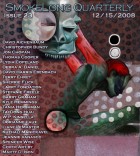The narrator in this story writes from the distant future in an attempt to change the past. How did you decide to begin the story so far after the mother’s murder? What advantages do you see from structuring your story this way?
I guess the choice to write from that distance was sort of a default one. That is, Tristen was a friend of mine and his mother was the first victim of the Genesee River Killer. In writing this piece I tried to imagine what my old friend might be thinking now, how he might, this many years later, imagine his mother, or how he might still grieve. I didn’t know when I set out what affect that would have, but I think in the end that the distance, for me, actually made the piece more tragic. I suppose that is because this a grown man sort of laying this out for someone who is gone, who has been gone for so long that all he has left are these residual images and memories that are, at best, worn out. I’m sure one of the flaws in starting so late is a more fuzzy (in relation to image or narrative) kind of story, if a story is what we want to call it. But I suppose that kind of lines up with the way I imagine memory, that it becomes more and more static over time, more sort of myth than reality.
Believability is a tool writers rely on to allow the reader to stay in suspended disbelief. In your story, you create a sense of believability without an overabundance of traditional sensory details that could have slowed the pacing. How do you balance detail versus movement? When do you say, “This is enough for people to trust what I’m writing about?”
I think the most important thing in the early drafts was just trying to get the voice right. I imagined once I got that right that the rest of the piece would have that feel of authenticity, which I think allows the reader to stay in suspended belief. When I am drawn into a story it is often the voice that makes me go along for the ride. Beyond that I just rely on the responses of the trusted readers I have. Usually the four of them provide the sort of litmus test that makes clear how well I’ve sort of struck the right balance.
The advice the narrator has for the mother is heartbreaking because of how little is asked of her. “Marry for money. Have affairs. But lottery tickets.” These are hardly top-priority items children ask of their parents. How did you come up with this list?
I suppose the advice Tristen gives his mother is really about the neighborhood I grew up in. I was thinking of my own mother and her dreams. I don’t suppose she dreamed those exact things, but as someone who really worked hard all her life and gave everything to her kids I always thought she wanted really small things for herself, or I mean for her own happiness. That being said, I could imagine her sometimes when she was sitting in the dining room, smoking a cigarette and playing solitaire, dreaming about a husband who was a CEO instead of a janitor, or maybe hitting it big on “Win for Life.” I think she always meant to take us, my brother, my father, and me, with her but I could see the other lives she might be picturing. I guess I just thought Tristen might, like I did when I was a kid and even now, kind of want those things for his mother or might imagine how his life, their life, would have been different had she married another man or if she’d come into money.
The Genesee River Killer was a real person in Rochester, New York, and you are working on more stories set in Rochester. Can you discuss the importance of setting in your stories?
It is sort of strange that this piece found a home when it did because Arthur Shawcross, “The Genesee River Killer,” just died a few days ago (or I guess a month or so when this comes out). He had a heart attack or something like that while serving his life sentence. Odd. That being said, Rochester is extremely important to all of the pieces in my collection. To me I think we learn the most about character, over the course of a piece or over the course of a book, by the place where the stories are unfolding. I know for me that growing up in Rochester, New York has significantly impacted the way I see the world and the way I come to understand it in my writing. I suppose I inflict this same influence on my characters, all of whom are real people from my hometown and my life there. I think living in a city that relies heavily on Kodak as a source of revenue, or living in a city where it snows so freaking much, or being so close to someone who was a part of this kind of dark legend fascinates me. My work, sort of like a collection of poems, tends to reuse images over and over again, and in that way I guess I am interested in thinking of the book as a space to explore place and the most resonate aspects of it. My worry is that I might paint the place in a way that makes it unrecognizable to its citizens, but then I suppose this really cuts to how we come to understand a place and understand our own little world within it.
In your cover letter, you thanked Randall Brown for some advice he had given you. Care to share what he said and explain how it was helpful to you?
It’s funny you ask because Randall’s advice was actually really simple and relates to the issue of trust. At the time the title was something real obvious like Tristen’s Letter of Warning or something like that. He told me “cut the crappy title.” Not in those words of course. And then there was an epigraph about the killings. He told me to cut that too. I think in the end cutting them was really about saying, “No, I don’t need this to gain the reader’s trust. I’ve done enough, without these gimmicks, to make the piece work.” I just needed someone with a good eye to tell me that.



 The core workshop of SmokeLong Fitness is all in writing, so you can take part from anywhere at anytime. We are excited about creating a supportive, consistent and structured environment for flash writers to work on their craft in a community. We are thrilled and proud to say that our workshop participants have won, placed, or been listed in every major flash competition. Community works.
The core workshop of SmokeLong Fitness is all in writing, so you can take part from anywhere at anytime. We are excited about creating a supportive, consistent and structured environment for flash writers to work on their craft in a community. We are thrilled and proud to say that our workshop participants have won, placed, or been listed in every major flash competition. Community works.